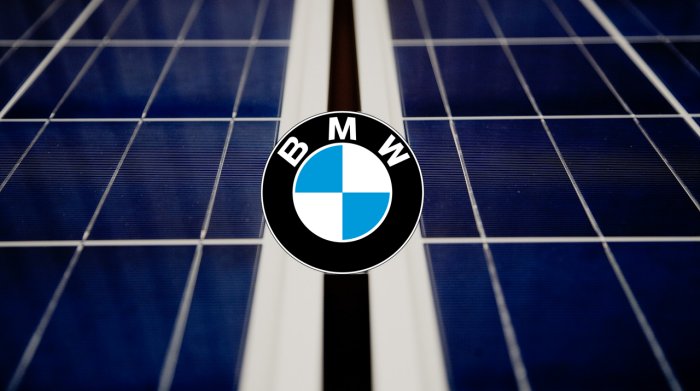
Solar panel image: marcusspiske
BMW Group announced at the UN Climate Change Conference in Bonn that its global operations will be powered by 100% renewable energy by 2020.
“The BMW Group has long been a partner of the UN Climate Change Conference and an active innovation leader in the field of sustainability,” said Markus Duesmann, Member of the Management Board of BMW AG, Purchasing and Supplier Network. “Decarbonization is a major theme in the sustainability discourse, and for the automotive industry it is and will continue to be a top priority.”
According to BMW’s Sustainable Value Report 2016 (PDF), the share of electricity from renewable sources at BMW Group globally was 63% by the end of last year.
“We make producing our own renewable energy a priority,” states the report. “If this is not possible due to prevailing conditions, we purchase green electricity locally as far as possible.”
An example of the company’s solar use is BMW’s new plant in Mexico, which will incorporate 71,000 square meters of solar panels. With the addition of wind power sources, the plant will run entirely on renewables.
A more novel approach to energy supply can be found at BMW’s South African plant, which sources some of its electricity from biogas created from food, cattle and poultry farm waste. During its first full operational year (2015), the facility supplied 15,844 megawatt-hours of electricity – 25% of the production plant’s electricity requirements. Solar power also features at BMW’s head office in South Africa.
BMW has also been turning up the pressure on its suppliers on renewables.
“We ask all suppliers involved in the CDP Supply Chain Programme to check that their emission goals for the reporting period of 2017 are compliant and to formulate their own science-based targets. This process cannot be implemented without a clear strategy change towards renewable energy.”
As well as cleaning up production, BMW is striving towards greener products.
Electric vehicles have become a special focus for the company. By the end of 2016, the company said it had sold 100,000 EV’s and set it sights on another 100,000 electric and plug-in hybrid vehicle sales this year.
BMW has also engaged in a number of pilot projects demonstrating the viability of “second-life” applications for EV batteries, such as for solar energy storage, and past that, battery recycling.
“After a long vehicle life and subsequent use as a stationary storage unit, we aim to achieve the highest possible rate of recycling of the valuable parts,” states the company.
With regard to its ICE (internal combustion engine) models, BMW says it would have reduced CO2 emissions in its European new vehicle fleet to least 50% of 1995 models by 2020.
Last year, BMW Group was recognised as the world’s most sustainable automotive company in the Dow Jones Sustainability Indexes (DJSI).

 RSS - Posts
RSS - Posts



What is beginning to become a concern is that a very significant part of the particulate emissions generated by road traffic comes from road, tyre and brake wear.
No amount of renewable energy will resolve this issue. It actually appears that electric cars may worsen this issue due the fact that their mass is currently typically higher than that of a petrol or diesel car, meaning that the wear resulting from braking and acceleration is greater.
There may be some marginal improvements which can be made to brake and tyre compounds, but ultimately only reducing the uses of cars will resolve this problem.
Personally, I am more optimistic on this matter. Some simple changes can have large benefits. For example, in the United States asbestos is still permitted in brake pads. Fortunately, most manufacturers have eliminated its use even though they are not legally required to in the land of the free emphysema.
Electric cars use regenerative braking which slows the car without any physical contact and so brake pads are only used for hard braking. This means less brake pollution and brake pads last far longer in electric cars than conventional ones.
Once enough cars drive themselves they may almost never need to physically brake.
One of the reasons why road dust is dangerous is because it contains a lot of toxic particles from diesel vehicles. Once internal combustion engines are eliminated it becomes less deadly.
This doesn’t mean cars kicking up particles won’t be a problem, but getting off oil will go a long way towards reducing the problem.
Realistically, this looks like an area which still needs more research. Some of the literature I have seen referenced indicates that EVs emit roughly the same PM10 emissions as ICEVs and 1-3% lower PM2.5 emissions.
While public transport has the same issues, for commuters, electric trains provide a much better environmental solution. Even buses probably still reduce the emissions per person trip.
The move to EVs and self-driving cars does not change the need for us to give up our addiction to cars.
Geoff “it was in the media so it must be true”. The facts of the report you are alluding to were completely false and commissioned by a fossil fuel entity. I will have to dig up the details again. While it was true the EV kicked up more particulates, the particulates that were being disturbed were from ICE cars. Anyone can bend the truth in a “report”.
The internet was supposed to be a repository of knowledge. Instead it has enabled every nutter or those with an agenda to release false pseudo scientific rubbish.
Don’t believe everything you read.
Believe Ron though. He is awesome! He actually puts effort into researching his topics.
Here you go: https://m.youtube.com/watch?v=cOsAb760o48.
Commentary starts at around the 30sec mark.
Edinburgh university student wrote a “report” for a Swedish diesel parts manufacturer as an assignment. Media found it and published it as gospel. It was essentially a university assignment.
Like i said don’t believe everything you read. Make sure it comes from a reputable source.